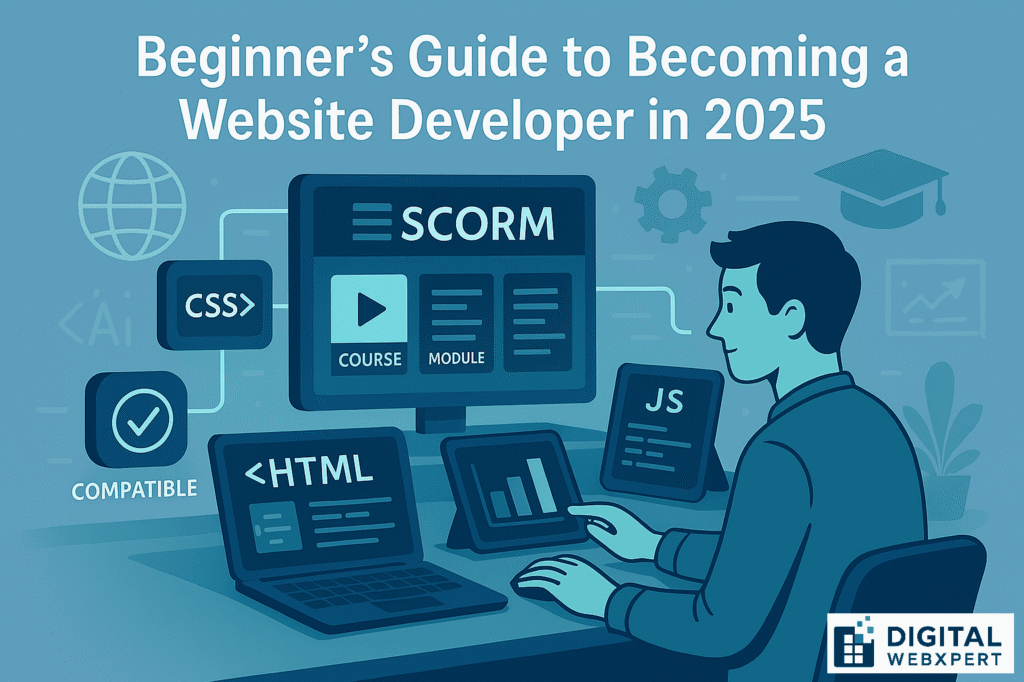In today’s digital world, every business needs a website, and behind every great website is a skilled developer. If you’re a small business owner, startup founder, freelancer, or aspiring techie, becoming a website developer in 2025 is more achievable than ever before—thanks to the abundance of learning resources and modern tools.
In this beginner’s guide, we’ll break down:
-
What web developers do
-
Skills you need
-
Front-end vs back-end roles
-
Tools and languages to learn
-
Career opportunities
-
A complete roadmap to start today
Let’s dive in! 💻
👨💻 Who is a Website Developer?
A website developer builds and maintains websites. They are responsible for everything from creating visually engaging interfaces to implementing complex server logic and ensuring fast, secure performance.
There are 3 types of website developers:
-
Front-End Developer – Handles layout, design, and interactivity (HTML, CSS, JS)
-
Back-End Developer – Manages servers, databases, and backend logic (PHP, Node.js, Python)
-
Full-Stack Developer – Combines both roles
📈 Why Become a Website Developer in 2025?
-
💰 High demand & competitive salaries
-
💻 Flexible work: freelance, remote, or full-time
-
🌍 Work with clients globally
-
🚀 Launch your own business or startup
-
📚 Learn online at your own pace
According to Statista, web development jobs are expected to grow by 16%+ in the next 5 years.
🛠 Essential Skills Every Website Developer Needs
To become a successful website developer in 2025, you should master:
🔹 Front-End Skills
-
HTML5 / CSS3 / JavaScript (core building blocks)
-
Responsive Design (Bootstrap, Flexbox, Grid)
-
Version Control (Git, GitHub)
-
DOM Manipulation
-
Web Accessibility
🔹 Back-End Skills
-
Server-side Languages (PHP, Python, Node.js)
-
Database Management (MySQL, MongoDB)
-
RESTful APIs
-
Authentication & Authorization
-
Hosting (cPanel, VPS, AWS, DigitalOcean)
🔹 Soft Skills
-
Problem-solving
-
Time management
-
Communication
-
Adaptability & eagerness to learn
📚 Step-by-Step Roadmap for Beginners
✅ Step 1: Learn the Basics
-
Start with HTML, CSS, and JavaScript
-
Use freeCodeCamp, W3Schools, and MDN Web Docs
✅ Step 2: Build Simple Projects
-
Personal portfolio website
-
To-do list app
-
Responsive landing pages
✅ Step 3: Version Control with Git
-
Create GitHub account
-
Learn basic Git commands:
commit,push,pull,merge
✅ Step 4: Explore Front-End Frameworks
-
Bootstrap, Tailwind CSS
-
React.js or Vue.js
✅ Step 5: Learn a Back-End Language
-
Start with PHP or Node.js
-
Build CRUD apps with a database (like MySQL or MongoDB)
✅ Step 6: Practice with Real Projects
✅ Step 7: Host & Deploy Your Website
-
Use platforms like GitHub Pages, Netlify, Vercel
-
Learn basic DNS & cPanel if working with clients
🚀 Top Tools & Platforms for Website Developers
-
Code Editors: VS Code, Sublime Text
-
Frameworks: React, Laravel, Django
-
APIs: REST, GraphQL
-
Testing: Jest, Postman
-
Design: Figma, Canva, Adobe XD
-
Collaboration: GitHub, GitLab, Notion
🔍 Career Paths in Web Development
Once you build a strong foundation, you can choose from several exciting paths:
-
🎨 Front-End Web Developer
-
🔧 Back-End Developer
-
🌐 Full-Stack Developer
-
🛒 E-commerce Developer (Shopify, WooCommerce)
-
🧠 UX/UI Developer
-
📱 Mobile Web App Developer (React Native, Flutter)
🌟 Tips to Stand Out in 2025
-
Build a stunning online portfolio
-
Contribute to open-source projects
-
Stay updated with tech trends (AI, Jamstack, Headless CMS)
-
Learn about performance & SEO
📊 What’s New for Website Developers in 2025?
-
AI-powered code assistants (like GitHub Copilot)
-
Low-code platforms are rising, but custom devs are still in demand
-
Web3 and decentralized applications
-
Jamstack architecture is going mainstream
-
Core Web Vitals affect SEO & UX heavily
✅ Final Thoughts
Becoming a website developer in 2025 is more accessible and rewarding than ever before. Whether you’re launching your own freelance business, joining a dev team, or simply upgrading your skills, this career path offers freedom, flexibility, and future-proof potential.
Start small, build consistently, and stay curious. The web is waiting for you! Contact us for more in details.
🙋♀️ FAQs
Q1. Can I become a website developer without a degree?
Yes! Most developers today are self-taught using online platforms and project-based learning.
Q2. How long does it take to become job-ready?
Typically, 6–12 months with consistent learning and hands-on practice.
Q3. What’s the best language to learn first?
Start with HTML, CSS, and JavaScript — the foundation of every website.
Q4. Do I need to know both front-end and back-end?
Not necessarily. Start with one side. Full-stack is optional and can come later.

